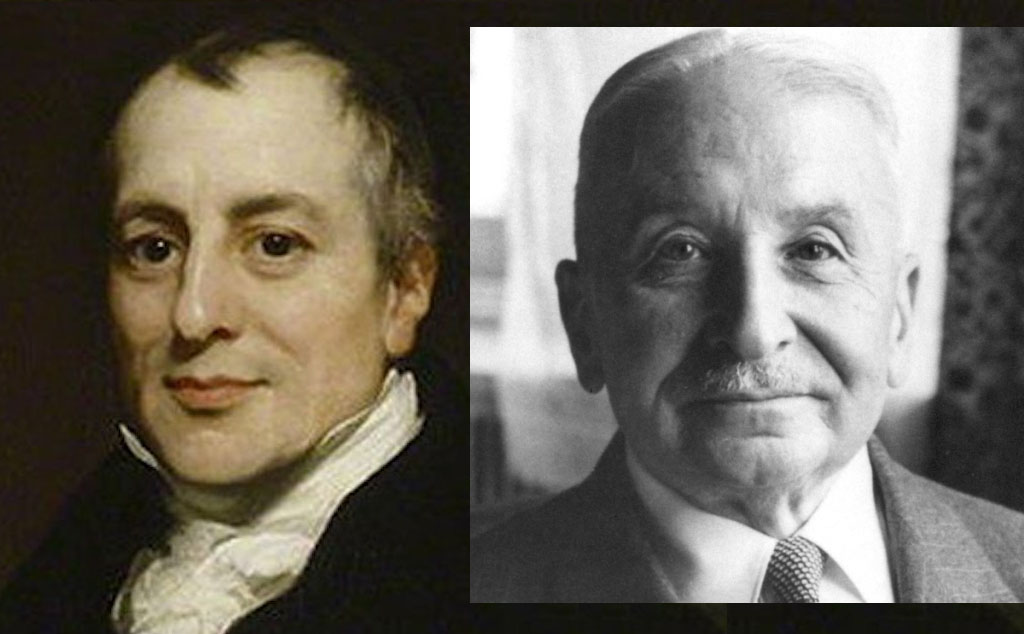
When I was an undergraduate at Fordham University, I had as one of my teachers Professor William J. Hines. He was a portly, affable man who specialized in Victorian literature, and who—like many Irishmen—was given to tangential discursiveness.
"It never occurs to these Deweyite ideologues that a student who is disinclined to listen to lectures or take notes simply doesn’t belong at university. He doesn’t have the attitudinal disposition to do serious college work, and should never have been admitted to school in the first place."
One day Hines got on to the subject of college education in general. He started in on its difficulties and rewards, and on the best way to negotiate one’s way through four years of Jesuit education. He said something that forever stuck in my mind, probably because he employed a triple figure with both assonance and alliteration. Hines said, “There are three things a student must have to be successful in college: aptitude, amplitude, and attitude.”
By aptitude Hines meant intelligence and perceptive ability, the power to think rationally and express oneself well in both speech and in prose. This is what vulgarians today would call “smarts” or “chops.” By amplitude Hines meant the financial wherewithal to pay your tuition and spend four years in a state of unemployment. But the kicker, said Hines, was attitude, and this was the reef on which many students foundered despite their intelligence and their affluence.
An attitude is a state of mind, and an emotional disposition. It is the frame of reference (call it baggage, if you like) that a student brings with him when he enters the classroom. And this attitude is either a support or an obstacle to his academic success.
A successful student’s attitude is marked by curiosity, a willingness to listen, patience with detail, and respect for the subject matter being covered. It is also manifested in steady and punctual attendance, careful note taking, and genuine effort on assignments and tests. The unsuccessful student’s attitude is pretty much the opposite, and is manifest right from the get-go. He’s disinclined to attend regularly, or to do more than a perfunctory job on assignments. He’s visibly bored with the class, and rarely takes notes. He’s distracted, self-absorbed, and sometimes a bit hostile. Every college teacher has had experience with these goof-offs, and dreads their presence in his class.
In the past, these dysfunctional types tended to drop out in freshman or sophomore year, after getting an unambiguous message from faculty, administrators, and fellow students that they were wasting not only their own time, but everyone else’s. The cutoff point was a GPA of 2.0—fall below that consistently, and you were usually asked to leave.
Unfortunately, there was always a small but vocal fifth column of Deweyites in faculty and advisory positions who spoke out vociferously on our need to keep these losers in college, despite their obvious incapacities and lack of academic commitment. But up until about 1970, they were just a minority of pedagogical dreamers whom we could easily ignore. After that time, however, major political and countercultural shifts in America worked to ensure the ascendancy of these radical Deweyites, who for all practical purposes took over American higher education.
All of a sudden, if a student had a bad attitude, it was now assumed that it was the job of the college to fix it. Failing that, faculty members were expected to labor mightily to “motivate” the student with radically innovative methodologies designed to accommodate his aversion to traditional pedagogy. The slogans were predictable: No student is uneducable! No student is allowed to fail! Education must be democratized!
It was all silly twaddle, of course, as every sane person in academia realized. But as fate would have it, the ideology of educational change came along just at the moment when it could serve a colossal pecuniary purpose. And when an ideology joins forces with good old American acquisitiveness, you always get a “movement’ of juggernaut-like dimensions. That’s when the Pedagogical Revolution took off. The mindless enthusiasm of Deweyites, combined with a massive infusion of cash, jump-started the whole thing. Let me explain.
By 1970, government money was pouring into academia. For the first time in history, school administrators and the professoriate began to get rich. And the way to keep that situation going and to extend it was to turn college into a universal requirement, and to transform the nature of higher education into something that could in fact be universal in a practical sense. That meant two things: opening up the gates, and simplifying the curriculum.
By opening the gates, educationists took away anyone’s excuse for not becoming an undergraduate, and at the same time they put anyone who chose not to attend college at a competitive disadvantage in the jobs market. And by diluting the curricular requirements, educationists guaranteed that most students would endure their four years and keep paying tuition. Does anyone fail to see that this was as cynically manipulative and profit-obsessed as a Mafia protection racket? (Well, the liberal professors don’t see it—they’re still spouting the slogans about “equal opportunity” and “democracy,” even as they collect their huge paychecks.)
One example of this trend was the implementation of “Open Admissions” in the C.U.N.Y. system here in New York City. This policy shift guaranteed any student who had graduated from high school (in itself a meaningless feat by 1970) a place at a C.U.N.Y. college. The propaganda and hype for Open Admissions spoke of nothing but “equal opportunity” and “democracy” and all the other buzzwords that liberals get wet in the crotch for. But everyone was too polite to mention its actual aim: to be a massive jobs-works program for school administrators and faculty. The hiring of professors exploded, and administrative staff began its inexorable metastasis into what is now over sixty percent of the college work force. Higher education, as a result of the Pedagogical Revolution, became as lucrative as the numbers racket in old Chicago.
A further consequence of the Pedagogical Revolution is that the student with an attitude problem is no longer a problem at all. He is merely another warm body who gives his share of tribute money (supplemented by government subsidies) to the college lucky enough to have him. And the Deweyites on the faculty (who maintain what Marx would have called the ideological superstructure of this complex exploitation game) reflexively parrot a vigorous defense of his presence, and our obligation as a faculty to guarantee his academic success. They either don’t see or they close their eyes to a protection racket that is enriching them and their schools, even as it saddles students with unmanageable debt.
It never occurs to these Deweyite ideologues that a student who is disinclined to listen to lectures or take notes simply doesn’t belong at university. He doesn’t have the attitudinal disposition to do serious college work, and should never have been admitted to school in the first place. But when you bring this up at a faculty meeting, there is universal outrage and indignation. Everyone will fall over themselves, in dramatic high dudgeon, to condemn your insensitivity and callousness. They’ll make noise about “different learning styles,” as if education were a form of couturier fashion. They’ll orate about “heuristic learning,” as if that stupid phrase actually meant something. Some of the women faculty will break down and weep (why are female professors so lachrymose, I wonder?) and make passionate speeches about “our responsibilities as caring educators,” or some such drivel.
Well, that sort of reaction can be expected from a modern, politically correct faculty of left-liberal lemmings. But the more interesting thing is how the school’s administration reacts to the whole dispute. The higher-ups, being entirely on the Deweyite side of the debate, vigorously support the tripe about heuristic learning and collaborative strategies and experimental methodologies.
Why? If you have to ask why, you are a hopeless naïf. As a result of the Pedagogical Revolution, schools have become businesses, and businesses are interested in one thing only: making money. Apart from the Ivies, colleges in America are in savage competition for students and their tuition dollars. They simply cannot afford to pass up a potential customer. So quite naturally they support any educational innovation or quack theory that promises to be more inclusive and welcoming, and thereby more financially lucrative. The more students, the more cash! Hence the manic urge to let everyone in, make them feel at home, and rake in the hefty tuition checks and concomitant government aid money that such inclusiveness guarantees. As a result, we have the nationwide racket whereby radical educational theory and its insufferable jargon go hand-in-hand with administrative greed, just as drug addiction works to fill the coffers of organized crime.
The grossly inflated cost of a college education today, along with the incessant drumbeat of educationist propaganda insisting on its absolute necessity for everyone, has made higher education a cash-cow of unimaginable dimensions for everyone involved in it other than the despised adjunct faculty who do most of the teaching. No one who profits from such a cash-cow wants to kill it or diminish its profitability. Hence the economic motive behind Deweyite theorizing—the more a school adopts trendy and open-ended teaching methodologies, the more likely it is to attract a large pool of students along with their tuition dollars. Lectures turn a lot of marginal students off; sitting in groups and emoting is more palatable to these dopes who, after all, pay the same money as serious students do. So the school’s administration (especially the Bursar’s Office) says let’s have more emoting and less lecturing. It’s as simple as that.
The racket is so typically American that one wants to laugh at its predictability. New ideas and crackpot enthusiasms are spouted, promoted, and plugged, all in the holy name of progress and enlightenment, while it turns out that their actual purpose is to serve crass capitalist profit. Karl Marx would have seen this in a flash. Why can’t our fashionably left-wing faculty see it?

